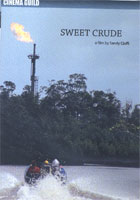
Sweet Crude 2009
Distributed by Cinema Guild, 115 West 30th Street, Suite 800, New York, NY 10001; 212-685-6242
Produced by Sandy Ciofi, Tammi Sims, Kate Wolf, Leslye Wood
Directed by Sandy Ciofi
DVD, color, 94 min.
Sr. High – Adult
African studies, Area studies, Domestic Violence, Economics, Environmental Studies, Geography, History, Human Rights, International Relations, Law, Media Studies, Postcolonialism
Date Entered: 01/07/2011
Reviewed by Jason R. Harshman, The Ohio State UniversityWho owns natural resources in Nigeria? The answer to this weighty question certainly depends on one’s perspective and relationship to the conflict over the oil fields in the Niger River Delta depicted in Sweet Crude. Long before the recent oil spill in the Gulf of Mexico, director Sandy Ciofi began telling the story of the oil related tragedy that has severely disrupted the lives of thousands of fishermen and farmers and killed off aquatic and land species living along the heavily polluted Niger River. Further, the tense and violent political relationship that has developed between the military-led, oil-company supported government of Nigeria and the youth-inspired, grass roots movement led by the Movement to Emancipate the Niger Delta (MEND) has become international news in the last few years not for the ecological destruction but as part of the discourse around terrorism and oil prices. This documentary is told from the perspective of those Nigerians who live along the river and who must contend with excessive pollution and, despite their initially non-violent protests, violent and often deadly repression at the hands of the military’s Joint Task Force (JTF).
Oil was discovered during the waning days of British colonialism in the Niger River Delta in 1960 and since that time the citizens of Nigeria have contended with dictatorial governments that are supported by the profits of oil companies. These revenues rarely reach the citizens of Nigeria who instead must live between pipe lines that run on top of the ground or often force them to the cities in search of low-paying jobs. In response to these unjust practices, non-violent movements—most famously led by Isaac Adaka Boro in 1966 and Ken Saro-Wiwa in 1995—began but were ultimately crushed when these leaders and many of their supporters were killed by the ruling government. The film effectively documents the motivation for these movements—resource control and self-determination—as well as the complications that have arisen within the movement over the past few years so as to counter the mainstream story of terrorism and hostage taking that has come to define this movement.
An important aspect of this film is the director’s attention to the negative impact of globalization and international media. Ciofi addresses how media has manipulated the truth regarding the motivations of MEND to fit a Western narrative. The world defines the people of the Niger River Delta as deficient because they are impoverished and terrorists because of actions taken by some Nigerians against the oil companies; however as argued and proven, their current situation in terms of economics and political actions were forced upon them and is often the case, desperate circumstances breed drastic measures in order to have one’s voice heard.
Despite the poverty and diminished life span—the average Delta area resident now only lives to be 40 years old—that has been caused by the oil companies, many villagers focus on the ecological destruction due to the waste that is dumped in the water and the air pollution and resultant acid rain caused by smoke from open fires at the local Chevron Oil refinery. The epilogue to the documentary provides important statistics regarding how important Nigeria’s oil production is to the United States and how the production of this oil continues to erode the standard of living of most Nigerians. The questions posed by the villagers are genuine and simple: how do we stop this pollution? The answer given by Joel Bisina, a peace negotiator living in the Delta region, is just as unambiguous: stop polluting.
Although focused on the Niger River Delta, this documentary helps viewers not only develop a better understanding of why it is important to consider multiple perspectives when analyzing an issue, but also how the principles of democracy and critical citizenship apply and are exercised worldwide. Sweet Crude offers a balanced depiction of what has been transpiring in Nigeria for more than a half century and effectively addresses the relevance of the problems experienced by the residents of the Delta to all people worldwide.
Awards
- Lena Sharpe Award for Persistence of Vision, Seattle International Film Festival, 2009
- Special Jury Prize, DMZ Korean International Documentary Festival, 2009
- Best Feature, Newburyport Documentary Film Festival, 2009
- Best Documentary, Strasbourg International Film Festival, 2009
- Audience Choice Feature Film, Tallgrass Film Festival, 2009
- Best Documentary, Ellensburg Film Festival 2009
- World Premiere, Full Frame Documentary Film Festival, 2009